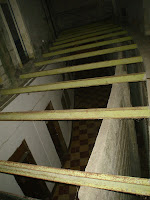I was delighted to read that the title of "World's Smallest Man" has been awarded to a 27 inch tall Colombian man who feels very happy because he is unique although he does get bothered by people always touching him and picking him up. I can understand that. I too know the burden that being an unusual size can be in Latin America.
Before I continue with this post I should probably clarify the limitations of my "unusual size". I am just over 5 foot 9 inches and a UK size 12-14. Before I came to Latin America I had never realised just how outlandishly large I actually was. I brought my clothes in regular high street stores, I unselfconsciously stood next to "normal size" people, and the great British public never bothered to tell me "You're so BIG". Thankfully the Venezuelans soon set me straight.
Here are some of the things that I've been told/asked here:
- "You're so BIG" (countless times)
- "Gordita...." (Fatty) (also countless times)
- "Are you sure that you would fit in a two man tent with one other man?"
- "You should go in the front of the car because you won't fit with two other people in the back"
- "Please could you get out of the car and move around to the other side because you are weighing it down too much on one side."
- "Do you do lots of sport? Because you're so BIG. Really REALLY BIG. Bigger than Novio".
I know that I am quite tall, even by British standards (not tall enought to be a model or anything good like that) and that women here tend to be slightly smaller. But not fitting in a 2 man tent?!?!
For a while when I arrived I thought that I must be body dismorphic, seeing myself as an elvish waif, when in fact I am an almighty, hulking beast. It had to be me or everyone else here. Thinking about it, and after various reassuring emails from friends in the UK, I'm pretty sure that it's everyone else here.












